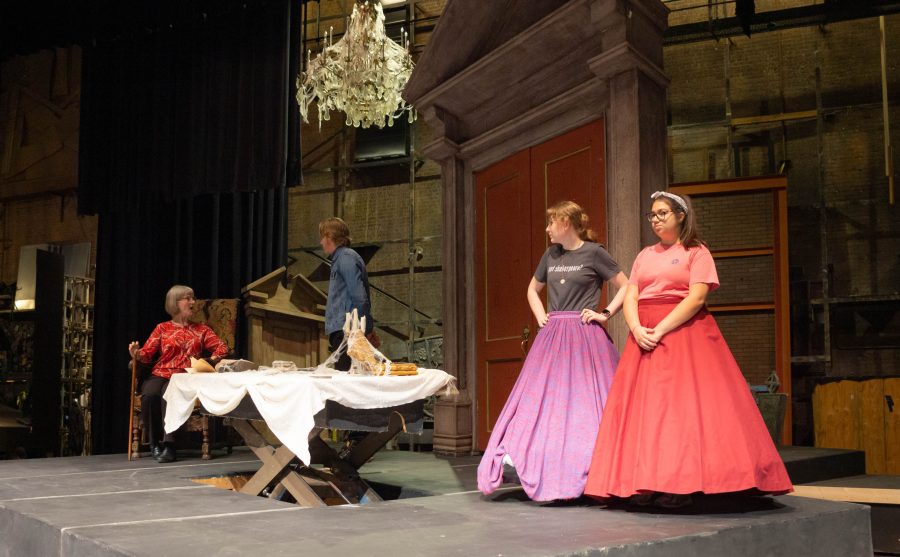Some students may have “great expectations” for the next artist series on Oct. 31 through Nov. 2 in Rodeheaver Auditorium at 7:30 p.m.
Charles Dickens’ classic novel Great Expectations has been adapted for the stage in this BJU Artist Series production. The story depicts Pip, a young orphan boy, who finds that when his dreams of high status in society are fulfilled, they are not everything that he expected. Michael Cunningham, a sophomore majoring in theatre, will take on the lead as Pip. Although he has been in three BJU productions before Great Expectations, this will be Cunningham’s first time playing a lead at BJU.
Cunningham said some of the most exciting elements in this performance are the characters of Great Expectations themselves. “I think the main appeal is how strange and eerie certain characters are and how they pull you into the story,” Cunningham said. He went on to describe one of Dickens’ most infamous characters in Great Expectations, Miss Havisham.
“She hasn’t changed anything about herself in 20 years; she hasn’t changed her hair, she hasn’t changed her clothes, she hasn’t washed her hands,” Cunningham said. “All these different intricate little things that make us squirm are a part of the story, and you just accept them from the beginning.” In this adaptation of Great Expectations, Pip narrates the story as it is performed.
“I think that another one of the things that draws you into the story is how vulnerable Pip is,” Cunningham said. Cunningham said that Pip’s narration of the story makes the audience feel as if Pip is divulging his secrets for the first time as his memories play back on the stage.
Cunningham feels that students can connect with Pip’s vulnerability that he shows in his narrations. “It’s a story about a person who’s looking back on their life and realizing the things that they’ve done, the mistakes that they’ve made, and coming to terms with them and healing them.” Cunningham said.
Another student involved in the production is Andrew Clater, a senior majoring in journalism and mass communication, who has a history with the BJU production of Great Expectations. BJU rotates many of its dramatic artist series productions in 10-year cycles, and in 2009, Clater was in his first BJU theatre performance, also Great Expectations.
Clater was in sixth grade attending Bob Jones Academy when his choir director recommended him for the role of the “pale young gentleman” boy counterpart. Clater got the part and enjoyed his time on the production, collecting memories such as joking with the other castmates when they were not on stage during the performance.
He also enjoyed his scene with Pip as a young boy, where Clater comes out and spontaneously starts a fight with Pip for no apparent reason. A decade later, Clater is working on the Great Expectations production as both a lighting technician and the found spot coordinator, the person coordinating the lighting technicians who follow the actors on stage with a spotlight as the performers move.
He said that his first role in Great Expectations ignited his love of theatre. Clater drew some comparison between his role behind the scenes in the 2019 production and his role as an actor in the 2009 production. He said as a found light coordinator, he views the production at the beginning very technically, making sure everyone on stage is lit properly, but as the performance goes on, he can start enjoying the story as a whole.
“It’s kind of cool to see from the big picture instead of just my little scene,” Clater said. Clater’s relationship with Great Expectations has a bittersweet yet ironic twist.
“Because we don’t have a show next semester, [Great Expectations] will be my first and my last major artist series,” he said. Ron Pyle, the director of BJU’s adaptation of Great Expectations, wants students to realize that though Dickens wrote this story in the 19th century, several of its messages can still apply to our lives today. In Dickens’ tale, Pip starts to desire things like wealth, respect and popularity.
“Pip is born in very humble circumstances, and yet he desires those things,” Pyle said. “Then when they happen to him, he finds out that [they weren’t] what he was expecting, and [they don’t] make him happy.”
Pyle says he thinks many people in the U.S. struggle with this temptation of wanting to reach for what they do not have now, and since that is a driving force in the play for Pip, the audience can connect with the character and the message of this story even though Dickens’ story is set in 1860. Pyle ultimately hopes that people learn from this performance that we should be satisfied with what God gives us in life.
“My hope would be that people would leave realizing that the most important thing is learning to love the people that God has put with us,” Pyle said, “To love them well, instead of being so ambitious, to get above wherever God’s put us in life.”
Tickets are available online at bju.universitytickets.com. Tickets are free for BJU students and $36-$45 for the general public.
























































